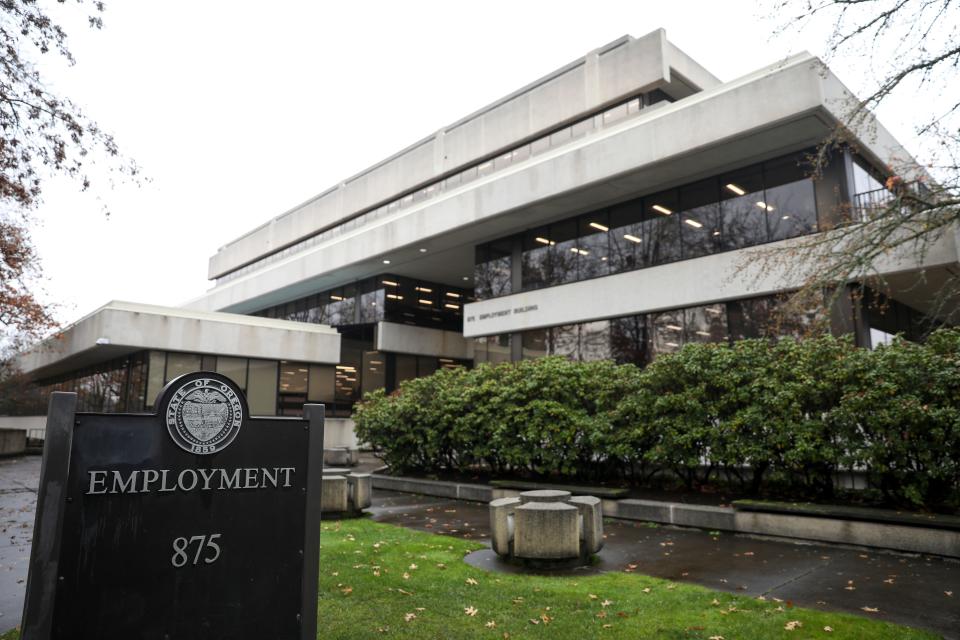Thousands of Oregon residents asked to pay back unemployment benefits from COVID-19 pandemic

Rowan Hayes, a 25-year-old Clackamas resident and former swim instructor, found herself in need of support when the COVID-19 pandemic shut down pools and paused lessons. Between April 2020 and March 2021, she applied for and received various forms of unemployment to help make ends meet.
It’s a decision she has come to regret.
Hayes, like thousands of other Oregonians, must now pay back thousands of dollars the department later determined that it overpaid her. In Hayes' case, she could be paying them back for nearly 50 years.
And she isn't alone. Other residents have issued challenges to the state's rules for handling unemployment overpayments. One group sued the Oregon Employment Department and its director last year, contending the agency's processes deny residents their constitutional rights to due process.
Since March 2020, the department has waived more than $4.5 million in 1,175 overpayments made in unemployment benefits during the COVID-19 pandemic.
The Oregon Legislature approved Senate Bill 172 in 2021, creating an option to request a waiver for overpayments, and the agency has encouraged people who have received overpayment notices to apply for a waiver at unemployment.oregon.gov/waivers.
But the system in place for overpayments remains confusing, according to the lawsuit. The Oregon Law Center filed the suit on behalf of six low-income individuals who were ordered to pay back benefits.
The six individuals each followed up with OED when they were told the state had overpaid them, according to the law center's attorneys.
"Despite these efforts, OED’s impenetrable, fragmented system utterly failed to provide them what the Constitution guarantees: a clear explanation for why the government could take back benefits already paid, and a fair chance to contest that decision at a hearing. They filed this lawsuit to change the system so they will never again have to suffer through the same experience," the motion states.
They are asking the court to declare that the agency's overpayment processes violated and continue to violate the due process clause of the Fourteenth Amendment and asking the court to immediately stop the collection of overpayments until OED establishes and implements a new system with safeguards in place.
Both the state and the half-dozen people have asked a judge to rule in their favor. A hearing on those requests is scheduled at the end of the month.
A 'SUPER confusing' process

For Hayes, trouble began when she received notice around December 2020, eight months after receiving benefits, that she was actually not eligible for regular unemployment benefits. Hayes requested an appeal and was soon contacted by a claims specialist at the Oregon Employment Department.
In their first exchange, according to emails her lawyer provided the Statesman Journal, Hayes is urged to immediately apply for another form of unemployment called Pandemic Unemployment Assistance, which the specialist told Hayes would be a “backup plan” in case her current claim was still denied.
In another email, Hayes is told that she has two options: proceed with her request for a hearing or withdraw the request and continue with her PUA claim. The denial of her regular claim would be offset with PUA benefits, she’s told.
“I really just don’t fully understand what’s going on at all,” Hayes replies on Jan. 8, 2021.
“All of this is SUPER confusing,” agrees the specialist the next day before telling Hayes she would “only technically have an overpayment.” Paying back regular benefits and being issued PUA benefits would be handled by the department electronically, the specialist adds.
With further explanation, Hayes agrees to withdraw her request for a hearing and checks again with the specialist that she won’t have to take any action herself concerning using PUA benefits to pay back unemployment.
In follow-up emails, Hayes asks about additional notices she has received in the mail, saying she got a stack of claim restarts in the mail.
“These are safe to disregard,” writes back the specialist.
'Miscommunication/misinformation', waiver denied
Emails between Hayes and the specialist spanned December 2020 through March 2021.
In February 2022, nearly two years after originally being approved for benefits, Hayes said she received a letter from the OED telling her the department had determined she was overpaid for regular unemployment, pandemic-era unemployment, and federal pandemic unemployment claims she received.
“I have received a letter from unemployment saying I have been overpaid and owe the money back within 15 days,” Hayes emailed the specialist.
The specialist never replied, Hayes said.
Hayes, who was pregnant at the time, requested another hearing challenging the decision before she went into labor. The hearing was held on her due date, but the overpayment decision was upheld. With a newborn to care for, Hayes said she let the deadline to appeal slip by. When she did appeal later, her appeal request was denied.
Hayes' waiver application also was denied, with the department claiming Hayes was ineligible because she caused the overpayment because she "misreported information."
During a conversation with the Statesman Journal, Hayes said she still does not understand how the specialist gave her what turned out to be incorrect information or why the agency fails to recognize “I made the decisions I made" based on exchanges with its own employee, she said.
At the hearing, the claims specialist submitted a response confirming she encouraged Hayes to apply to PUA and that she told Hayes the regular benefits she received would need to be paid back but balanced if she was determined eligible for PUA.
"I shared this based on guidance from PUA," wrote the specialist. "I apologize for any miscommunication/misinformation, and especially for the impact it had on the claimant. I acted based on guidance and information I had at that time."
Six Oregonians sue the Oregon Employment Department
The confusion surrounding overpayments at the OED prompted the Oregon Law Center to file suit on behalf of six other low-income individuals who were ordered to pay back benefits. The current system in place for overpayments is so confusing and disjointed that the notices represent a violation of due process, the center alleges.
In their motion, the center writes that OED's notices not only fail to provide the information people need to challenge alleged overpayments but that critical information is withheld until after deadlines for hearings pass under their two-notice system.
It is a process Melina Martinez, an attorney at the Portland State University's Student Legal Services, said she herself still struggles to understand.
The PSU Student Legal Services office provides free legal services to students. Martinez has been with the office since 2022 and has represented 10 students challenging overpayment decisions.
Martinez said she won all 10 of her cases, as the department is often wrong. She also questioned the OED's two-notice procedure.
Not a single one of her clients understood the significance of the first notice they got in the mail that told someone they were not eligible for benefits they already received, she said. When they don't appeal the first notice, an overpayment is created.
"This is an ongoing problem. It's not just affecting the plaintiffs in the case. It's affecting a wider number of people, most of whom don't have access to legal counsel," Martinez said. "It's sinking people."
The exact number of people who were determined to owe money is unclear. In their motion, the plaintiffs say at least 61,236 overpayments became final between January 2020 and May 2023.
OED told the Statesman Journal it did not have records immediately available.
At least 4,400 people have been found at fault for their overpayment but may still be eligible for a waiver, representatives for the OED told the Statesman. The total amount that could be waived is more than $5.5 million, they said.
Overpayments generally fall into one of three categories, they explained. Either the individual makes a mistake and gives incorrect information by accident, or they give false information on purpose to receive benefits despite being ineligible. The third is when the department makes a mistake.
Waivers can be requested in the first and third cases but cannot be granted by law in the second.
Ongoing changes, an overwhelmed department
The department declined to comment on pending litigation. They forwarded information from when the lawsuit was first filed and announced in June 2022.
Agency director David Gersentfeld said the agency was disappointed the Oregon Law Center submitted a complaint about the overpayment process, adding they had been working with the nonprofit law firm for years to find solutions to challenges faced by the unemployment insurance system.
"We share the common goal of providing our customers with the best possible service, and we understand that we are often the lifeline they need at a difficult point in their life," Gerstenfeld said at the time. "However, we are also responsible for operating the Unemployment Insurance program within the laws and rules set down by the federal and state governments."
He added that the agency had been transparent and open about what the department can and cannot do regarding overpayments and waivers within those rules.
In court records, Gerstenfeld said the agency continues to modernize its system and pointed to the historic number of claims made during the pandemic as a direct cause of the lag in making eligibility decisions. Hundreds of new employees were hired at the time, many with less experience and less time to do training.
There also were backlogs in amending initial decisions and establishing related overpayments.
"OED aims to issue overpayment decisions as soon as possible after issuing the decision reversing eligibility. In fact, as a part of the agency’s ongoing modernization project, beginning March 2024, OED intends to combine both the eligibility and overpayment determinations in a single notice whenever possible within the new system’s capabilities," Gerstenfeld wrote in his declaration.
As the hearing date approaches, Hayes is hopeful others will get relief. But she's cautious about being too optimistic.
Under her current payment plan, Hayes said the agency estimates she'll pay back the $14,000 she was determined to owe in 2066.
"I trusted the employment department and that was my mistake," Hayes said.
Dianne Lugo covers the Oregon Legislature and equity issues. Reach her at dlugo@statesmanjournal.com or on Twitter @DianneLugo
This article originally appeared on Salem Statesman Journal: Fight over Oregon's COVID-19 unemployment 'overpayments' rages on

